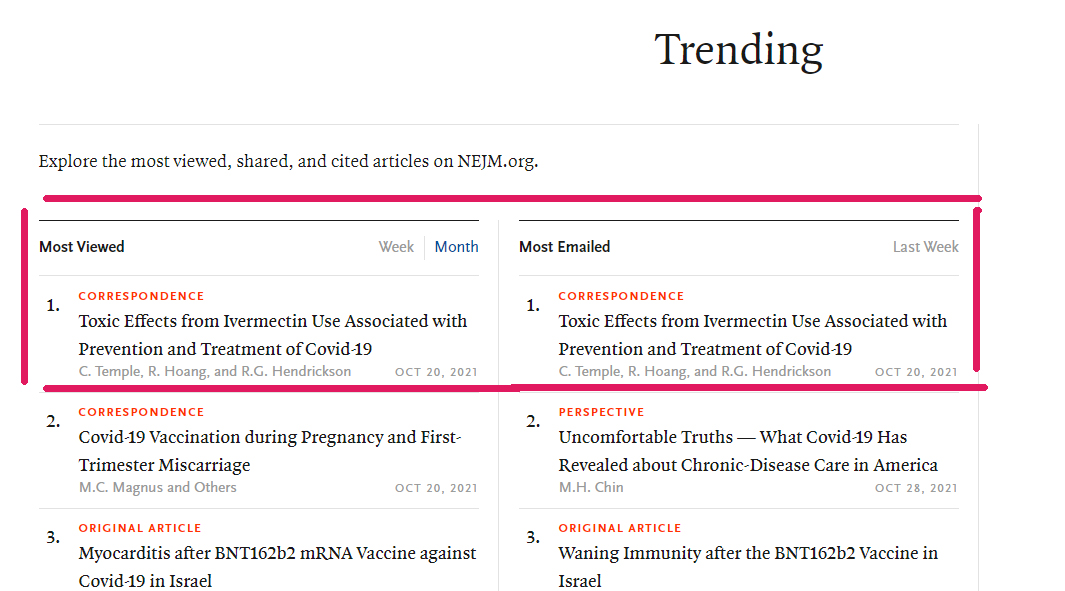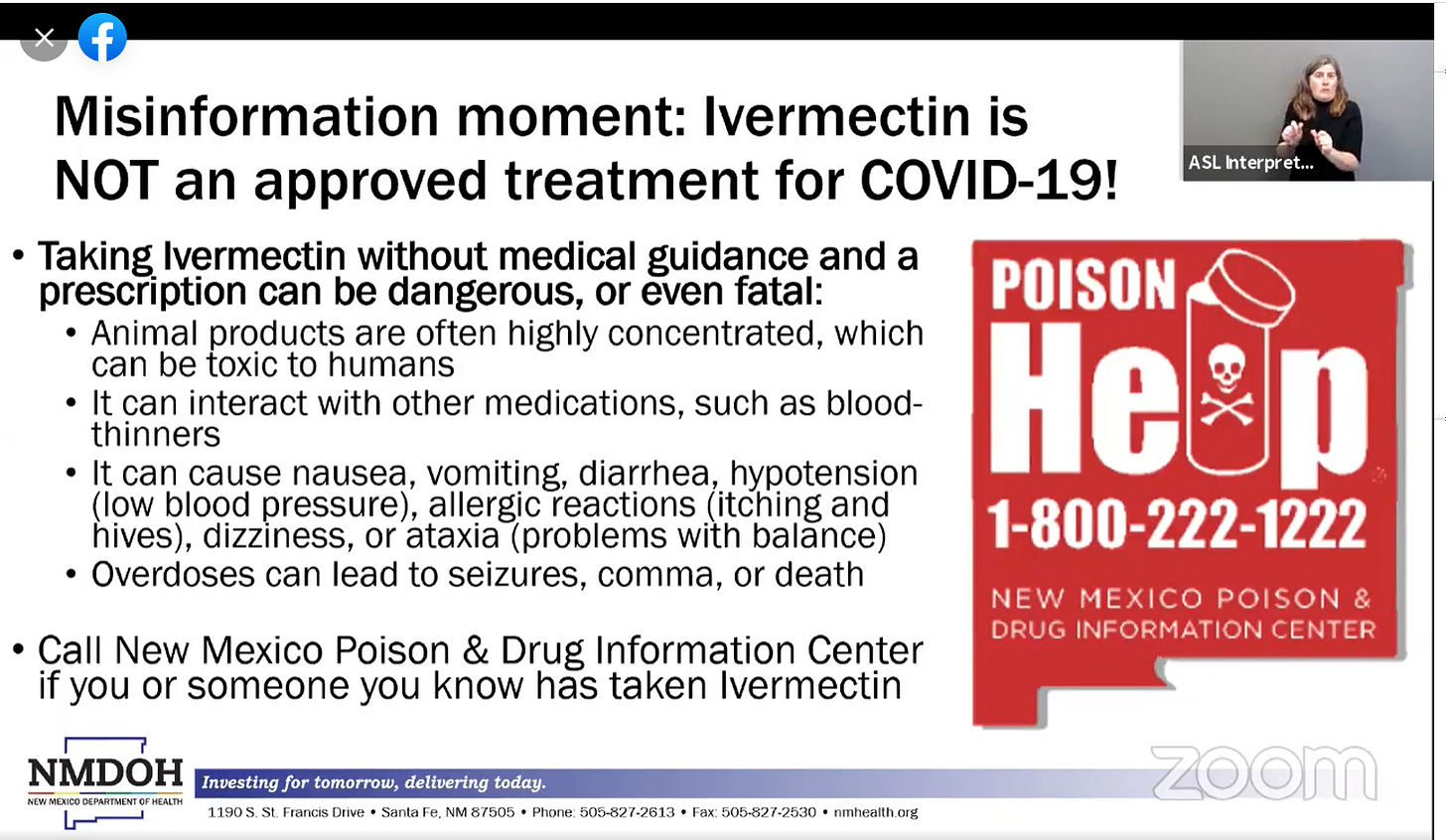Four Decades Ago the NEJM Helped Create the Opioid Crisis. Now It’s After Ivermectin.
The New England Journal of Medicine published a small note that set off a deadly epidemic, and once again tragically misleads the public.

During the last week of October, the most viewed and shared item in The New England Journal of Medicine was a letter to the editor from three Oregon doctors titled “Toxic Effects from Ivermectin Use Associated with Prevention and Treatment of Covid-19.”
The letter, an anecdotal account of twenty-one calls about ivermectin during August to the Oregon Poison Control hotline, has already been elevated by the press as “a new study” warning of the “dangerous side effects from taking ivermectin.” Medpage Today called it a “small observational study.”
Letters to The NEJM are known to have enormous influence. One of the most notable is the Porter and Jick one-paragraph note to the journal in 1980, now credited with helping to create the ongoing opioid crisis, which in 2019 alone killed 50,000 people.
Headlined “Addiction Rare in Patients Treated with Narcotics,” the Jick letter was cited over 600 times, and at a mere 101 words, stunning in its effect. It has been analyzed and even apologized for over the years as the tragedy of unfettered opioid prescriptions unfolded.
Although a bit longer, the ivermectin “toxic effects” piece gave little context to support its conclusion: twenty-one people, located in Oregon, Guam, or Alaska (the area covered by the Oregon Poison Center), called about ivermectin. Of that group, around half reported taking the drug for prevention of covid-19, the rest took ivermectin to treat symptomatic covid-19. Most were over-the-counter veterinary versions, three were prescriptions (one was unknown). Six of the callers were hospitalized, four of them in the ICU. “None died.”
Included in the letter were a variety of ivermectin doses, some quite low; left out were any facts connecting doses to symptoms and “toxic effects,” making it impossible to conclude what doses the hospitalized patients took. No information was given as to any other cofactors in the hospitalizations, including covid-19.
Considering the long, safe history of ivermectin use, under ordinary circumstances such vague information would raise red flags. But not now.
Regardless of the scant details given, the Oregon doctors scored a touchdown in getting published in the most prestigious of medical journals, perhaps a defining moment in pharma’s propaganda campaign against ivermectin, with their note poised to have the same type of pernicious influence as that created by the Jick letter’s stamp of approval for opioids.
In 2017, four Canadian doctors concluded that the Jick letter was “heavily and uncritically cited as evidence that addiction was rare with long-term opioid therapy” and that it contributed “to the North American opioid crisis by helping to shape a narrative that allayed prescribers’ concerns about the risk of addiction...”
By contrast, the contrived shaping of the ivermectin narrative has taken us in the other direction.
Since its FDA approval for parasitic diseases in people in 1996, ivermectin has been considered a remarkably benign drug. Taken by billions of human beings, this Nobel Prize-awarded medication has an astounding track record of safe use. It goes without saying that taking an extremely large dose of ivermectin intended for animals would produce side effects, but the NEJM letter authors give no specifics, simply ending their dispatch with a grocery list of adverse reactions. This leaves a legacy of “serious side effects” for other articles to cite for confirmation as to the risks in taking ivermectin—even as prescribed by a doctor.
I wrote to the authors, based out of the Oregon Health and Science University, to get more details. I heard back from one, Dr. Robert Hendrickson, who gave a vague reply that if ivermectin is taken in too large a dose “toxicity may develop.” The rest of my questions, Dr. Hendrickson said, could not be answered “out of respect to the privacy of (the) individuals…” who contacted the Oregon Poison Control Center (I didn’t ask for names or any identifying information).
And that’s the way it seems to go with ivermectin. Big, bold, unsubstantiated and frightening statements are made, some found to be blatantly untrue, yet the band marches on, generating volumes of frantic media reports in the process. Meanwhile, other stories, those detailing the doctors and patients who have achieved miraculous results using ivermectin as a perfectly legal off-label treatment for covid-19, are labeled as “misinformation.”
In October, investigative journalist Mary Beth Pfeiffer and I unraveled one of those media feeding frenzies—what started the ivermectin “horse paste” story. It was triggered by a snippet of outrageously false information put out by the Mississippi Department of Health that 70 percent of calls to the state poison control were over animal formulations of ivermectin, clarified by the DOH forty-six days later as really being just 2 percent. That represented four calls in all, a fact still not mentioned by the DOH.
And that wasn’t even the worst of the horrific hype. By early September, a death in New Mexico from “someone who took ivermectin,” was publicized at a press conference by Acting Secretary of the New Mexico Department of Health, Dr. David Scrase, adding, “this is unofficial, but I heard about it anyway.” By the September 22 press conference Scrase had added a second suspected fatality.

When asked several times as to the resolution of Scrase’s “unofficial” yet headline-generating statements, New Mexico Department of Health media staff were unable to provide any information other than to say the “reports of two deaths have not been confirmed,” and “death certificates are protected health information.”
The media, however, wasted no time in jumping right in.
A USA Today headline read “2 die of ivermectin poisoning.” Other outlets ran their own tabloid-style versions, and Dr. Scrase requested anyone who has simply taken ivermectin or even who knows someone who has, to call poison control “and we’ll go from there.”
Despite the all-out efforts to keep doctors from prescribing ivermectin, pharmacists who refuse valid prescriptions, and the flood of dubious press reports on the dangers of taking this established drug, requests for ivermectin had skyrocketed to nearly 90,000 prescriptions a week by mid-August, as reported by the CDC.
Perhaps the CDC, FDA, the mainstream media, and NEJM should let the success of ivermectin in treating and preventing covid-19 create its own narrative—and we’ll go from there.





Stock up on it now, as they'll soon move to remove it from the marketplace, as they do with every low-risk, higly effective medication (see phenylpropanolamine & pseudoephedrine for examples).
So disturbing… anything that goes against receiving these injections is vilified. How can people be so blind!